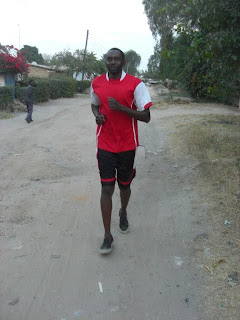
Issa is my running partner. He has known my colleagues and predecessors for several years and one day I express an interest in the sports youth centre and the street kids project he runs in Saba Saba. I go and visit one Sunday afternoon. Amidst rows of mud shacks selling second-hand clothes, I’m greeted by a dozen teenage boys standing around a worn out pool table. “No I'm not Muslim” I answer after being asked the familiar question which almost always follows my introduction. I like that most people are convinced ‘Sophia’ is a Tanzanian name. At least they can remember it that way. I play a game but am promptly defeated by a twelve year-old boy in less than 10 minutes. I immediately warm to the boys as they are kind and respectful and are in awe of Issa! They show me their gym: Issa’s resourceful creation made of rundown car parts and bits of rusty metal. It reminds me of the amazing Frankenstein industrial constructions listed in www.afrigadget.com, a website Uncle Tim recently told me about. Issa then takes me straight to a board with some ripped pieces of paper showing in faded ink how their squad made it to the semi-finals in 2006 and the quarter-finals in 2008 of a local soda football championship. Now Coca-cola has taken over even that and the boys can no longer afford the entrance fee and equipment requirements. They are not the street children Issa works with but are clearly from humble backgrounds and prefer to hang around here on a Sunday. They normally borrow a local school’s football pitch but depending on the teacher in charge they are often asked to leave even if no one else is using the ground. Issa does not seem put off by this and has plans to register as a charity and turn the main hut into a brick-built room. I ask if I can come to exchange skills once a week: I’ll support their academic work if they train me in sports. Fair exchange is no robbery, right?
I start a daily routine of jogging at the crack of dawn with Issa by my side. He arrives in his worn out fabric pumps at 5:45 am and only the moonlight illuminates our way for the first 20 minutes. There are no people around to shout names and annoying phrases and the air is cool and calm. We part ways after an hour and I arrive for a welcome cold shower and breakfast while the sky is still a creamy peach colour. It’s revitalizing in so many ways and Issa is the perfect running companion: silent most of the way and runs in zig-zags when I need to slow down! He is in amazing shape, runs with a passion, just like he runs his social projects, taking none of the credit and giving all his time to the youngsters who need him so. I wish I could help financially but my Tanzanian shilling salary doesn’t go a long way so I try to think of the next best thing I could do. One morning I ask him if he’d like to run a marathon. “Ndiyo!” he says with his characteristic serious smile. “Right then Issa, I’ll help you set up a fundraising page!”. I explain that back home people often look for sponsors when undertaking big challenges such as a marathon and that this way he’d be raising the money himself by doing something he enjoys. Fat currencies will easily cover the costs of building a proper room for the teenagers to gather, and best of all the entrance fees and equipment the kids need to participate in the local football championship they’ve been longing to play in but have been unable to afford the last couple of years.



